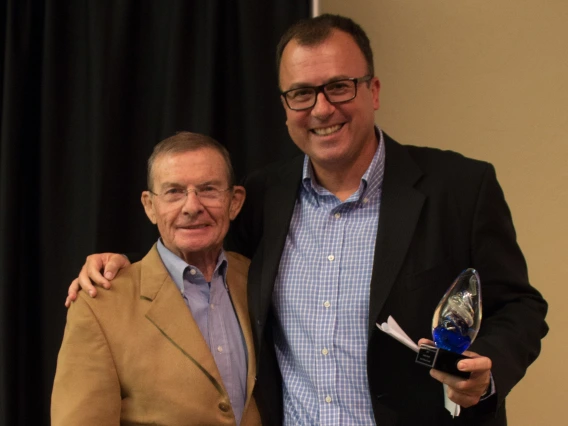Humanities Dean wins UA faculty diversity award

College of Humanities Dean Alain-Philippe Durand received the top faculty honor for 2016-2017 at the UA’s Visionary Leadership Awards Ceremony.
In his first year as Humanities Dean, Durand received the UA’s Richard Ruiz Diversity Leadership Faculty Award, which recognizes faculty members who are working to make the UA a more diverse and inclusive campus.
Durand, known to colleagues as “A-P,” is a Professor of French, Honors College Distinguished Fellow and Affiliated Faculty in Africana Studies, Latin American Studies and LGBT Studies.
Kendall Washington White, UA Assistant Vice President for Student Affairs and Dean of Students, presented the award, saying Durand received about 15 letters of nomination.
“A-P has demonstrated incredible impact for all criteria of the Richard Ruiz Diversity Leadership Faculty Award. Nominators highlighted his many amazing contributions to advancing diversity and inclusion on our campus,” White said. “A-P has worked tirelessly to hire and retain diverse faculty in terms of race, gender, nationality and sexual orientation, he has a deep concern for all students and his outreach with the larger Tucson community is extraordinary.”
The faculty award is named for the late Ruiz, who was head of the UA Department of Mexican American Studies in the College of Social and Behavioral Sciences, in honor of Ruiz’s many contributions to making the UA a better campus.
In accepting the award, Durand spoke of working with Ruiz and called the late professor a true “champion for diversity.”
“I would like to accept this award on behalf of all my colleagues, faculty and staff in the College of Humanities and share this award with all of them,” Durand said. “They are also committed to promote and celebrate diversity and inclusion in everything they do on a daily basis.”
Established in 2005 in honor of President Emeritus Peter W. Likins, the Inclusive Excellence Awards recognize individuals or groups who work to create a supportive environment at the UA, build a more academically robust and diverse student body, and recruit and retain diverse employees.
Durand is the second consecutive faculty member from the College of Humanities to win the Richard Ruiz Diversity Leadership Faculty Award. Professor Ana Cornide of the Department of Spanish and Portuguese received the award in 2016.








